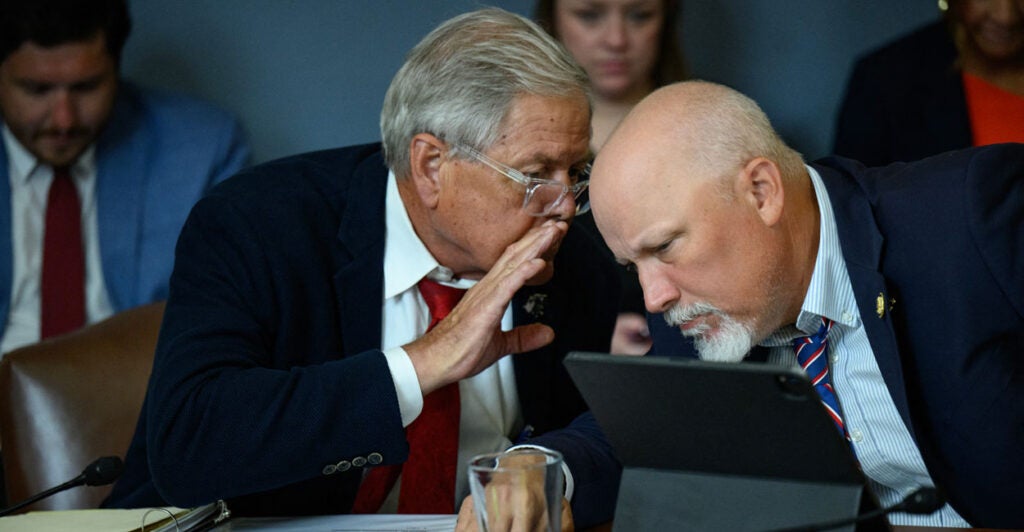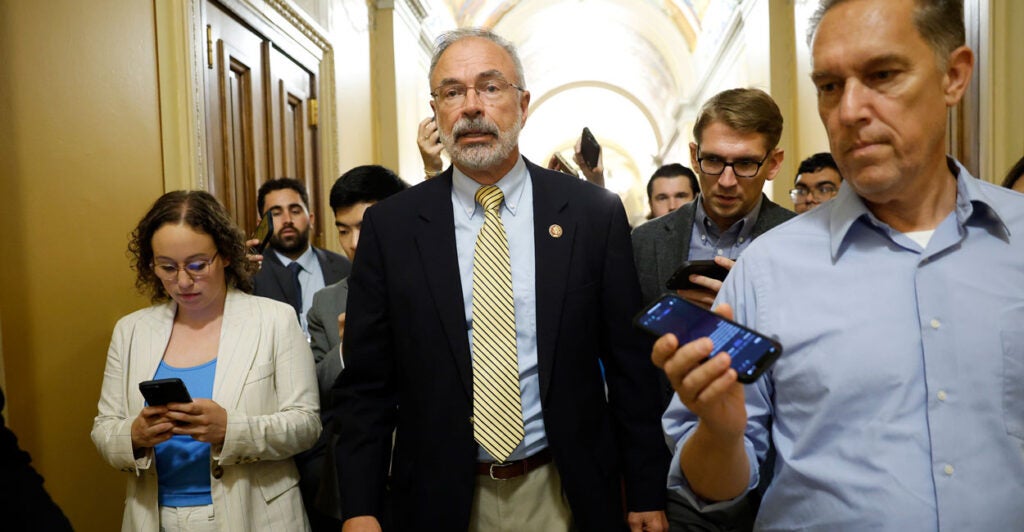The House of Representatives narrowly passed a massive 10-year budget framework, known as the One Big, Beautiful Bill Act, on Thursday in a triumph for the agenda of President Donald Trump and the Republican-controlled Congress.
“If you’re for a secure border, safer communities, and a strong military—this bill is for you,” Speaker of the House Mike Johnson R-La., said before the vote. “If you’re for fairer and lower taxes, bigger paychecks, affordable gas and groceries, and restoring dignity to hard work, this is the bill for you.”
Once signed into law by Trump, the nearly 1,000-page 10-year budget bill will extend his soon-to-expire 2017 first-term tax cuts while restructuring benefits programs and funding border security.
The bill, which required a simple majority in the House, was passed by a margin of 218-214 with Republican Reps. Thomas Massie, R-Ky., a fiscal hawk, and Rep. Brian Fitzpatrick, R-Pa., a centrist, joining all Democrats in voting against it.
Trump urged unity ahead of the vote, writing on the social media platform Truth Social on Tuesday, “‘THE ONE, BIG, BEAUTIFUL BILL’ sets the United States down a fiscal path by greatly reducing our Federal Deficit, and setting us on course for enormous Prosperity in the new and wonderful Golden Age of America.”
He added, “To my GOP friends in the House: Stay UNITED, have fun, and Vote ‘YAY.’ GOD BLESS YOU ALL!”
Speaker of the House Mike Johnson decided to bring the bill to the floor for a final vote without amendments shortly after its passage in the Senate in spite of serious criticisms from fiscal hawks in the House who argued that it must be amended in order to address Senate changes they saw as backsliding from conservative priorities.
Other factions had reservations about the bill’s restructuring of benefits programs, such as Medicaid.
Going into Wednesday, when leadership intended to pass the bill, it was clear it would be difficult to pass, as there were many vocal holdouts within the GOP’s razor-thin majority. A previous version of the budget reconciliation bill passed through the House by just one vote in May.
“I think we’ve got seven to 10 that will just say no, and we’ll sit up here as long as it takes to work something out,” Rep. Ralph Norman, R-S.C., a member of the House Freedom Caucus, told The Daily Signal on Tuesday.
Norman and Rep. Chip Roy, R-Texas, who sit on the House Committee on Rules, both voted early Wednesday morning against the rule to bring the bill to the floor, but it passed 7-6 through the committee.

Beyond hardline conservatives, it remained unclear Wednesday morning how moderate Republicans, such as Reps. David Valadao of California and Don Bacon of Nebraska would vote, since they had expressed reservations about the Senate’s new work to restructure Medicaid.
Despite that uncertainty, House Republican leadership hurried to bring the bill to the floor in an effort to send the bill to Trump’s desk by his preferred Independence Day deadline.
But on Wednesday morning, it came to light that the House Rules Committee made an error in drafting a rule to bring the bill to the floor.
Members of the Rules Committee neglected “to order the previous question” and restrict “intervening motions.”
Simply put, that means that if Republicans did not end up having the necessary votes when deciding on final passage, they would not be able to delay the vote.

As House Rules Committee ranking member Rep. Jim McGovern, D-Mass., explained Wednesday, that means the GOP leadership would not “have an escape hatch if they start it and realize they don’t have the votes.”
This vote to amend the rule stayed open from 2:15 p.m. to 9:30 p.m., when it was ultimately passed unanimously by Republicans—making it the longest recorded House vote in history.
Then, from Wednesday night into Thursday morning, Republicans finally voted on the rule to consider the big, beautiful bill. At one point, five Republicans voted “no” on the rule, putting it in jeopardy.
However, after hours of negotiating with members, leadership was able to finally bring the bill to the floor by flipping the votes of Republican Reps. Victoria Spartz of Indiana, Thomas Massie of Kentucky, Keith Self of Texas, and Andrew Clyde of Georgia.
Rep. Brian Fitzpatrick, R-Pa., however, who represents a swing-district in the Philadelphia suburbs, was unmovable and voted no on the rule.
Johnson said of these members Thursday, “A lot of members genuinely need time to digest what the Senate sent over. We didn’t have it that long and they deserved that amount of time to go through it and figure out the meaning and how it would be applied and ask questions of the administration.”
Then, before the main vote, House Minority Leader Hakeem Jeffries, D-N.Y., took to the floor for the “magic minute,” where he spoke from 4:53 a.m. until 1:37 p.m. as he denounced the package.
He broke the previous record for the longest ever House floor speech set by former Speaker of the House Kevin McCarthy, R-Calif., in 2021.
















